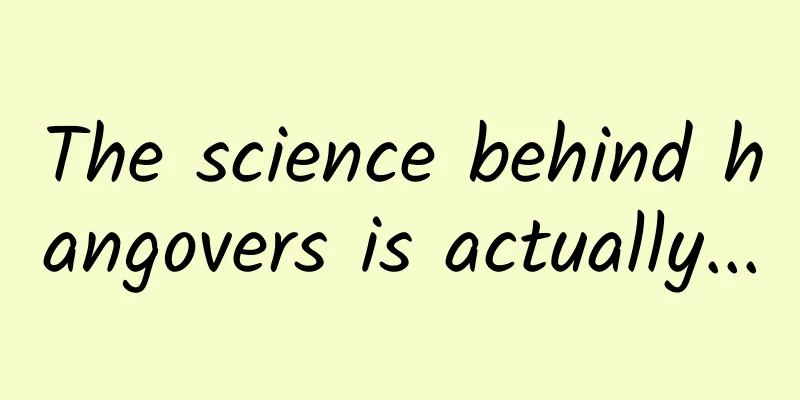The science behind hangovers is actually...

|
According to a report on the U.S. News Weekly website on August 6, it is no coincidence that August 6 is "International Hangover Day" and the day before it is "International Beer Day". Anyone who drinks alcohol will have experienced the feeling of being sick after a heavy night of drinking. To mark International Hangover Day, scientists have explained the biological basis of the hangover. Scientists say that in some ways, a hangover can be described as a mild withdrawal syndrome, in which the body responds to excessive drinking with an opposite physiological response. As soon as alcohol enters the brain, brain circuits begin to adjust to minimize the perturbations caused by the alcohol and restore the function of each circuit to baseline levels. As a result of this acute tolerance process, as the alcohol wears off, activity in circuits that were previously suppressed by the alcohol rises above baseline levels. For example, alcohol initially slows activity in the amygdala, a part of the brain involved in processing emotions. Alcohol initially reduces anxiety, but a rebound in amygdala activity the next day can lead to increased anxiety and irritability during a hangover. Likewise, as the alcohol wears off, the circuits that were initially activated by alcohol may become less active for a while. Alcohol initially increases activity in the brain’s reward system, but during a hangover, diminished reward activity can lead to physical discomfort and a lack of pleasure. Alcohol also turns into acetaldehyde, a toxic metabolite that causes inflammation and damages DNA. While alcohol may reduce the time it takes to fall asleep, it can disrupt sleep architecture and reduce total sleep time, which can lead to next-day fatigue. Sally Adams, an associate professor of psychology at the University of Birmingham in the UK who specializes in alcohol and addiction, said that when blood alcohol levels drop to lower levels, the body tries to metabolize it into waste products that can be cleared from the body. "To do this, the body produces a toxic chemical that makes us feel sick and nauseous," she said. "Also, after drinking, there is inflammation in the stomach and small intestine, dehydration and electrolyte imbalances. These effects combine to make us feel extremely ill." Adams said that so far there is no "convincing evidence" that any one product can prevent or alleviate a hangover. She added: "This may be because a hangover has many complex effects on the body and brain, and most treatments focus on addressing just one effect, such as treating dehydration with water. The only way to avoid a hangover is to not drink alcohol, or to drink in moderation." Scientists recommend that men should limit alcohol to no more than two drinks a day and women should limit alcohol to no more than one drink a day. The scientists also said spacing out drinking and eating in the evening would help reduce overall intake and protect the stomach from direct irritation. Methods for dealing with the discomfort caused by a hangover vary, but water, rest and time seem to be the common ingredients. (Source: Reference News) |
<<: "Lone Moon" is a hit: What kind of comedic sparks can scientists and filmmakers create?
>>: "Click" ~ "Click" ~ "Click"...How does a lighter ignite?
Recommend
The Wisdom of Traditional Chinese Medicine in the 24 Solar Terms
Brief introduction to TCM wisdom resources in the...
Sogou Advertising Strategy Case
Let me first talk about two cases to give you an ...
How much does it cost to join the Tongliao skin care products mini program?
How much does it cost to join a skin care product...
Challenging the world's first, how can Honor Smart Screen Pro compete with Sony X8500G?
After declaring that it "will not engage in ...
Briefly describe the production process of short videos! What is the process of short video production?
Some people shoot short videos for fun, some peop...
There is a new discovery! Behind these two bricks, there is a big secret...
Green-glazed lotus tiles, blue-glazed square bric...
Guangzhou Distribution Mini Program Store Decoration, How to Decorate the Page of Mini Program?
According to statistics, the number of WeChat min...
From novice to expert, teach you how to quickly play Sina Fuyi Advertising
When doing information flow advertising , after c...
How can humans achieve "banana freedom"? First, cure the "cancer" of bananas!
1. Overview 1.1 Banana’s function and value Banan...
Liangshan Mini Program Production Company, how much does it cost to produce a mechanical equipment mini program?
How much does it cost to produce the Liangshan Me...
Samsung Note 7's biggest embarrassment: S Pen still has the problem of not being able to rebound
On August 26, Samsung will officially release the...
Toutiao information flow advertising placement, placement costs and effects!
Toutiao is a platform that provides information t...
Electric Technology Car News: 7 seats + DCT SAIC's new Baojun 560 can save the declining sales
I believe everyone is familiar with the Baojun 56...
[Dry Goods] ASO optimization black technology: fast review, keyword coverage, Apple list update rules!
Quick review Let me tell you the specific operati...
"Universal Data Analysis Rules" master the essence of analytical thinking and master various business scenarios
Course Background In the era of big data, data ana...









